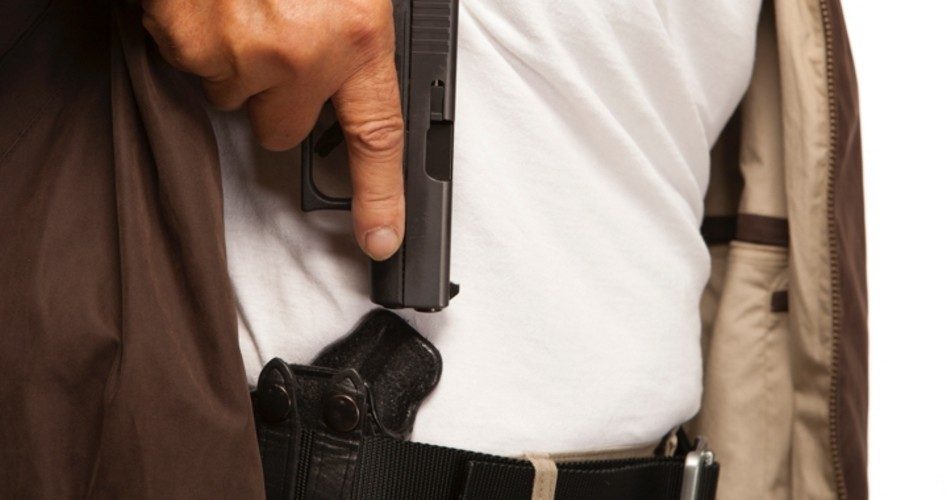
The House of Representatives passed H.R. 38, the Concealed Carry Reciprocity Act of 2017, by a 231-198 vote on December 6. The bill is being hailed by gun-rights advocates because it will allow people with permits for carrying concealed handguns in their home state to do so in any state that allows concealed weapons.
Though champions of gun owners’ rights have applauded this bill, it is badly flawed. In order to gain bipartisan support for H.R. 38, it was merged with H.R. 4477, the Fix NICS Act of 2017, designed to “enforce current law regarding the National Instant Criminal Background Check System.” (A copy of the merged bill can be read here.)
Very likely due to the inclusion of the background-check language, six Democrats voted for the measure; however, 14 Republicans also voted against the bill. Among those was Representative Thomas Massie (R-Ky.), who voted against the bill because, though he supports the concealed-carry reciprocity section, he did not want the background check portion attached.
“It throws millions of dollars at a faulty program and it will result in more law-abiding citizens being deprived of their right to keep and bear arms,” Massie wrote in a Facebook post before the vote.
A writer in The Hill expressed her opinion that attaching the concealed-carry reciprocity measure puts the bipartisan measure to beef up background checks in jeopardy in the Senate.
However, that report was written from the perspective of someone who favored the background checks but feared Democrats in the Senate would object to the concealed-carry reciprocity language and filibuster the bill for that reason. The Hill noted that a bipartisan coalition has enough votes to break a filibuster on enhancing background checks.
A constitutionalist defender of the right to keep and bear arms may also fear a filibuster, but would view the background-check portion of the bill to be the excess baggage that ideally should be removed.
The Hill reported that one other provision in the bill was drafted in direct response to the October 1 mass shooting in Las Vegas. After the shooting, law-enforcement authorities found a dozen “bump stocks,” which enable semiautomatic weapons to be fired at essentially a fully automatic rate, in the shooter’s hotel room.
While no one can possibly know what effect the use of bump stocks had on the Las Vegas shooter’s efficiency, the gun regulators have decided they are at fault and must go. The bill just passed by the House would require the Justice Department to report to Congress on the number of times a bump stock has been used in a crime.
Some lawmakers have been pushing for the Trump administration to clarify whether bump stocks violate the ban on fully automatic weapons manufactured after 1986.
The New American published a well-reasoned response to these efforts (“Why I Oppose Banning Bump Stocks”) on October 13. As we noted,
Right now leftists have bump stocks to focus on. Being driven by emotion and/or Machiavellian motives (depending on the person), the type of equipment targeted in an anti-gun push is secondary, at best. The only consistent theme is an effort to steadily, incrementally erode gun rights. It doesn’t matter what weapon or accessory is outlawed today because there’ll be another opportunity, and target, after the next high-profile gun crime tomorrow.
The argument for a restriction is always the same. Logically rendered it states: “This _________ (fill in the blank) is far too effective to be available to the general public.” What this misses is that Second Amendment rights don’t exist just to secure the opportunity to go target shooting or hunting.
They exist to ensure that Americans can have effective weaponry. Full stop.
The New American posted an article about H.R. 38 last August, shortly after the list of cosponsors of the measure reached 209, only nine short of the number required for passage. We noted that the National Rifle Association’s Institute for Legislative Affairs (NRAILA) was making passage of the national reciprocity bill its No. 1 priority, and that the bill’s passage was also urged by Conservative Daily. Jerry Henry, the executive director of Georgia Carry, told Breitbart at the time, “laws should simply address carry licenses the way many other licenses are addressed. With a driver’s license issued in Georgia, I can drive my vehicle in any other state in this country … providing I follow the laws of the state I am in at the time. My marriage license is treated the same way.” Henry added: “I have said for many years I should be able to carry anywhere a criminal carries.”
And President Trump said on September 18, 2015: “The right of self-defense doesn’t stop at the end of your driveway. That’s why I have a concealed carry permit and why tens of millions of Americans do too. That permit should be valid in all 50 states. A driver’s license works in every state, so it’s common sense that a concealed carry permit should work in every state. If we can do that for driving — which is a privilege, not a right — then surely we can do that for concealed carry, which is a right, not a privilege.”
The positive statements made by advocates of the right to keep and bear arms when H.R. 38 was a “clean” bill that did nothing more than extend the protections granted by concealed-carry permits to states other than the one issuing the permit were well justified.
Unfortunately, the cluttered-up bill that resulted from “merging” H.R. 38 with H.R. 4477 produced a bill that offered negative features along with the positive. This is why a handful of conservative representatives, such as Thomas Massie and Justin Amash, refused to vote for it.
One is reminded of the quote attributed to Otto von Bismarck: “Laws are like sausages. It’s better not to see them being made.”
Related articles:
Concealed Carry Permits Hit New All-time High
Pressure Building to Pass National Reciprocity
Pressure Building to Pass National Concealed Carry Reciprocity Law


